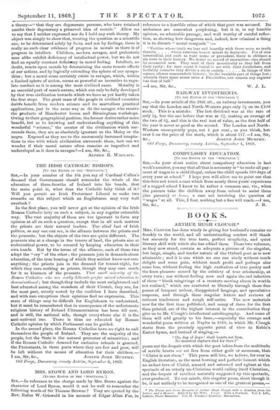THE IRISH CATHOLIC BISHOPS.
[TO THE EDITOR OF THE "SPECTATOR.")
SIR,—In your number of the 4th you say of Cardinal Cullen's demand that Government should surrender the whole of the education of three-fourths of Ireland into his hands, that the main point is, what does the Catholic laity think of it? Will you permit an Irish Protestant Liberal to make two remarks on this subject which an Englishman may very well overlook ?
In the first place, you will never get at the opinion of the Irish Roman Catholic laity on such a subject, in any regular ostensible way. The vast majority of them are too ignorant to form any opinion at all on such a question, except that in all such matters the priests are their natural leaders. The chief fact of Irish politics, as any one can see, is the alliance between the priests and the peasants ; but the objects of the two are quite different. The peasants aim at a change in the tenure of land, the priests aim at ecclesiastical power, to be secured by keeping education in their own hands. But by the terms of the alliance, each of these two adopt the " cry " of the other ; the peasants join in demands about education, of the true bearing of which they neither know nor care anything ; the priests join in the demand for tenant-right, for which they care nothing as priests, though they may care much. for it as kinsmen of the peasants. That small minority of the Roman Catholics who are really Liberals prefer mixed education to denominational; but though they include the most enlightened and best educated among the members of their Church, they are, for the most part, utterly cowed by the coalition I have described, and with rare exceptions their opinions find no expression. This state of things may be difficult for Englishmen to understand, but it must be remembered that in consequence of the unfortunate religious history of Ireland Ultramontanism has been till now, and is still, the national side, though everywhere else it is the anti-national one. There is thus no educated lay Roman Catholic opinion by which Parliament can be guided.
In the second place, the Roman Catholics have no right to call themselves the people of Ireland. They are the majority of the people, but the State is the natural protector of minorities ; and if the Roman Catholic demand for exclusive schools is granted, the Protestants, in those parts where they are few and poor, will be left without the means of education for their children.—






























 Previous page
Previous page